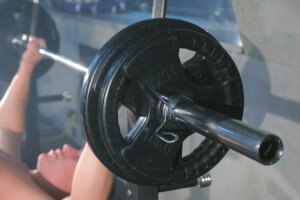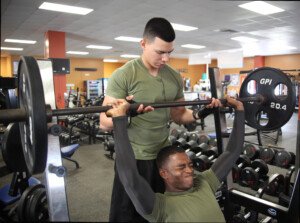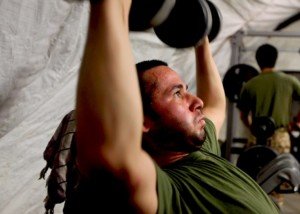
Let’s hear what a sports medicine surgeon has to say about lifting weights with a winged scapula, and this includes the bench press.
If a person has a winged scapula – an actual diagnosis rather than just an assumption based on what it looks like – would there be any reason to avoid lifting weights?
“If the winging is secondary to pain or instability, physical therapy/rehabilitation plays a significant role in the recovery process,” begins John-Paul H. Rue, MD, orthopedic sports medicine surgeon with Orthopedics and Joint Replacement at Mercy Medical Center in Baltimore, MD.
“Improper training or lifting techniques may contribute to this dysfunction, so it’s also important to ensure proper techniques when targeting specific muscles responsible for stabilizing the scapula.”
What about the bench press, shoulder press, bent-over barbell row and other classic upper body weightlifting moves?

Dr. Rue explains, “Yes, it is typically okay to continue to lift weights in the setting of scapular winging, but it’s important to know why the scapula is winging and to address this cause first.”
There are multiple possible causes of a winged scapula, including a dysfunction with the serratus anterior muscles – which do get engaged during the bench press.
“The principle concept would be to avoid lifting weights in a manner that may exert additional or abnormal forces on the shoulder,” says Dr. Rue.
“Scapular winging places the shoulder at a less than optimal position, so it would be important to not try to compensate for this with improper technique.” Great technique is very important in the bench press.
“Provided the weightlifting is not causing pain or worsening scapular winging or dysfunction, it may be okay to continue to lift weights. In this setting, it’s even more important to focus on form and repetition, and not necessarily the amount of weight.”
That’s a downer to hear if you’ve been working hard on bench pressing as much weight as possible.
Once the cause of your winged scapula is determined, the appropriate therapy can be set up.
You should work closely with your medical team if lifting weights, especially bench pressing and other shoulder-joint-centric movements, cause pain.
 Dr. Rue specializes in prevention and treatment of sports and exercise injuries. His primary focuses are knee, shoulder and elbow injuries including ACL and cartilage injuries, rotator cuff injuries and overuse tendonitis.
Dr. Rue specializes in prevention and treatment of sports and exercise injuries. His primary focuses are knee, shoulder and elbow injuries including ACL and cartilage injuries, rotator cuff injuries and overuse tendonitis.
 Lorra Garrick has been covering medical, fitness and cybersecurity topics for many years, having written thousands of articles for print magazines and websites, including as a ghostwriter. She’s also a former ACE-certified personal trainer.
Lorra Garrick has been covering medical, fitness and cybersecurity topics for many years, having written thousands of articles for print magazines and websites, including as a ghostwriter. She’s also a former ACE-certified personal trainer.
.


























